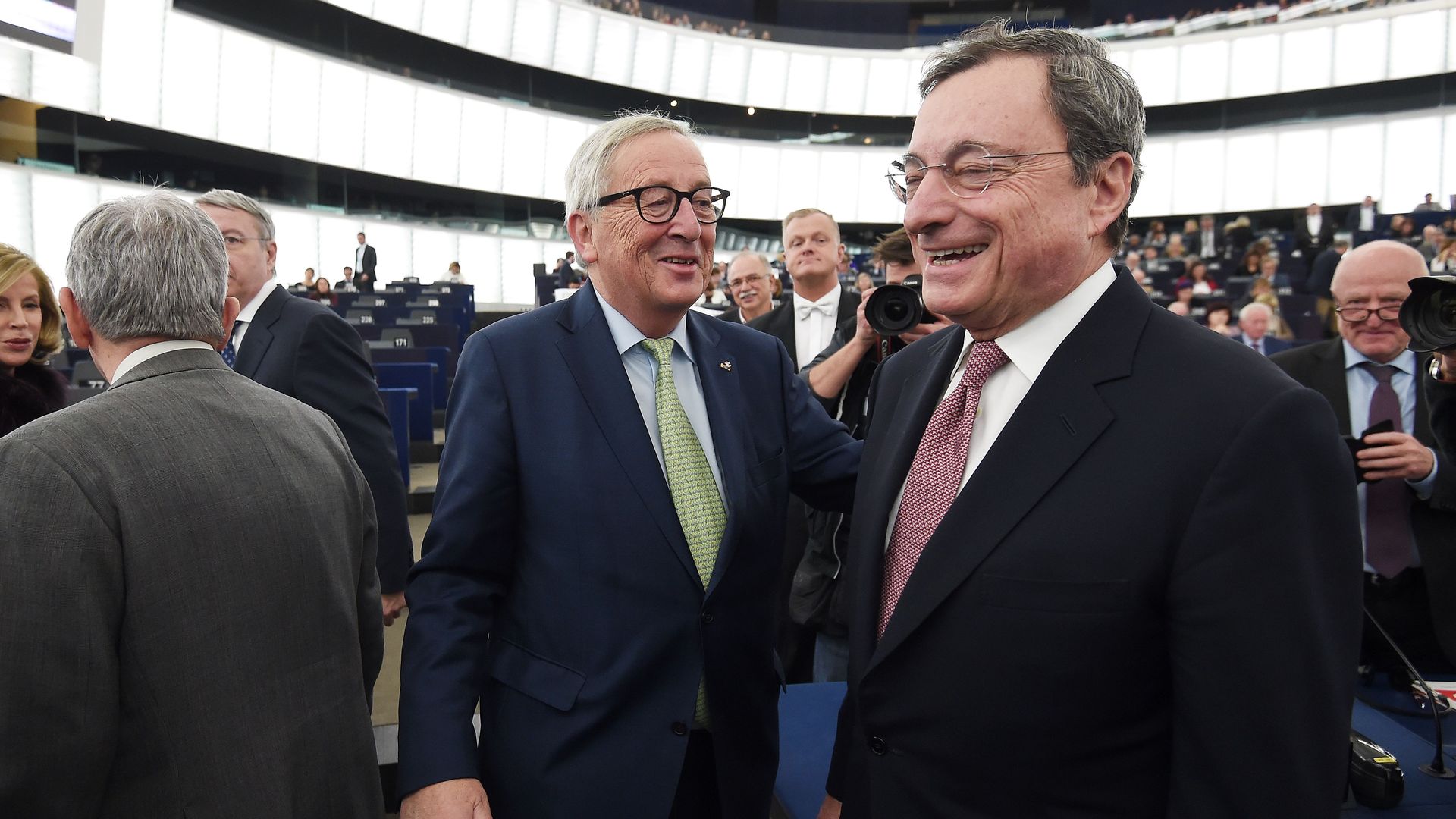Axios Markets

January 16, 2019
Was this email forwarded to you? Sign up here.
Situational awareness:
- Sears Chairman Eddie Lampert won out in bankruptcy court after increasing his offer to $5.2 billion for the bankrupt U.S. department store operator. (Reuters)
- Goldman Sachs, BlackRock, Bank of America, BNY Mellon and others report fourth quarter earnings today. (Nasdaq)
- World Economic Forum guests say the trade war between the U.S. and China is their top concern. Bank of America-Merrill Lynch's fund manager survey reported the same of consulted asset managers. (WSJ)
- How did companies spend their tax cut savings in 2018? Stock buybacks, mostly. (Bloomberg)
1 big thing: The recession alarms are ringing
Illustration:Aïda Amer/Axios
Economic data is pointing downward and investor sentiment is turning negative.
- 52% of investors said they expect global profits to deteriorate — the most since 2008, according to Bank of America-Merrill Lynch's monthly survey of fund managers.
- 60% surveyed say global growth will weaken in the next 12 months, levels not seen since the financial crisis.
- U.S. manufacturing activity dropped in December by the most since October 2008.
- The first Treasury auction of 2018 had the weakest demand since 2008, Bloomberg reported earlier this month.
- The yield spread between 2- and 10-year U.S. Treasury notes is the thinnest since 2007 and the yield on 2- and 3-year notes has already risen above that of 5-year notes, meaning a curve inversion.
Perhaps most worrisome is the massive pile of highly levered debt that continues to grow. BAML's survey finds that corporate leverage is the top concern among investors surveyed for the first time since 2009.
- UBS estimated in September that there was a "record $4.3 trillion in lower-quality corporate loans and high-yield bonds — up from $2.4 trillion in 2010 — that could ... see rising defaults if the healthy U.S. economy starts to wobble," USA Today reports..
- “I view this as the most severe threat to the economy and financial system,” Mark Zandi, chief economist of Moody’s Analytics, told USA Today in response to the UBS figures.
- Former Fed Chair Janet Yellen warned in a recent interview, “I am worried about the systemic risks associated with these loans. There has been a huge deterioration in standards; covenants have been loosened in leveraged lending.”
Still, there seems consensus among many in the market that it's not yet time to panic.
- “Investors remain bearish, with growth and profit expectations plummeting this month,” said Michael Hartnett, BAML's chief investment strategist. “Even so, their diagnosis is secular stagnation, not a recession, as fund managers are pricing in a dovish Fed and steeper yield curve.”
1 bonus chart: non-bank loans in the U.S.


Economists and market strategists have often pointed to U.S. bank balance sheets, which currently hold historically low levels of risky assets and debt, as evidence that there is not significant systemic risk. The issue, however, is just how much debt is held by institutions other than banks — those without FDIC protection and trillions of dollars in deposits to fall back on if things go bad.
- Companies other than banks, like Quicken Loans and LoanDepot, now originate more than half of all U.S. mortgages and payday lenders like Check Into Cash or Title Max are used by 12 million Americans a year, who spend $9 billion on loan fees.
What they're saying: “We’ve never been in an environment where there were quite this many non-banks,” Michael Bright, executive vice president and chief operating officer of Ginnie Mae, a government housing agency that buys and insures many of the loans issued by non-bank lenders told the Washington Post in September. “So we need to take some additional measures, in my view, to prepare for an economic environment with either higher delinquencies or higher interest rates.”
2. Unbrexit
U.K. Prime Minister Theresa May lost yesterday's Brexit vote by an astonishing margin, cobbling together only 202 votes for her Brexit deal, writes Axios' Felix Salmon.
Worse, there were 432 votes against it, including 118 of the 317 MPs representing her own Conservative party. That makes this vote the biggest and most consequential government defeat since at least the 1840s.
- May seems secure in her premiership. Her Irish coalition partners have said that they will support her in today's confidence vote, and May has given no indication that this stinging defeat will force her resignation. There might be more no-confidence votes, however, in coming weeks.
- With May's attempt at Brexit having failed, it is now up to Parliament to come up with an alternative. The chamber's view is clear on one point: There is an overwhelming consensus on both sides of the aisle that a no-deal Brexit cannot be allowed to happen.
The only choice left would seem to be no Brexit. Britain can change its mind and decide to stay in the EU after all, or it can ask the EU to agree to a delay, pending a second referendum. That second referendum would probably result in a vote to remain, especially given that about 1.5 million young voters have become eligible to vote since the 2016 referendum, and a huge majority of young Britons want to be part of Europe.
Be smart: Don't believe anybody who tells you that they know how this is all going to play out. Britain is caught up in political chaos, and just about any option is still possible, including a hard Brexit, another general election, or a change in Conservative party leadership. That said, the possibility that Brexit might not happen at all is looking increasingly likely.
Go deeper: Second Brexit referendum looks more likely than ever
3. More stimulus could be on its way to the euro zone
European Commission President Jean-Claude Juncker (L) and President of the European Central Bank Mario Draghi (FREDERICK FLORIN/AFP/Getty Images)
European Central Bank President Mario Draghi gave hints that he may continue the central bank's bond-buying program through this year, saying the economy of the 28-member bloc is weaker than he previously expected.
Germany's 5-year low in economic growth reported this week along with unimpressive reports from Italy, Britain, France and Spain (the euro zone's largest economies) in recent months have given that impression, even as the bank said it would solider on raising interest rates and cut its 15 billion euro per month stimulus.
- Draghi also highlighted risks from Brexit and the economic slowdown in China.
The central bank just last month began to phase out its bond purchase stimulus program that has totaled 2.5 trillion euros, in a first step toward higher interest rates. Interest rates on some deposits are still negative in the euro zone.
4. Maybe China's weak data is a good thing
Stocks globally bounced on Tuesday, despite this week's troubling news from China. The world's second largest economy reported much weaker than expected trade data, noting a 4.4% drop in exports and a 7.6% decline in imports. In response, Chinese authorities announced a new raft of stimulus measures.
Some investors expect that the new stimulus is just what markets to jump-start returns in 2019.
"More imports, fewer exports in December reflect lagging data. It’s the next two quarters that matter due to the lagged effect of Beijing’s policies."— Nancy Tengler, chief investment strategist at Tengler Wealth Management
- Tengler points out that in 2015 China saw its growth slow and global stocks sold off because of worries about a weakening global economy. Beijing responded with aggressive easing in monetary and fiscal policy.
- That led to major stock market rallies around the world in 2016, after the U.S. stock market experienced a horrific opening six weeks.
- The Fed was also poised to raise rates in 2016, but with oil prices falling to near $25/barrel and sentiment turning bearish on the equity market the central bank paused instead.
- China's additional stimulus and easing of interest rates, as seen above in its Shanghai Interbank Offering Rate, should power equities higher again this year, Tengler argued in a note to clients.
5. Et tu, Esther? The Fed's hawks lose their talons
Kansas City Fed President Esther George said in a speech yesterday that the central bank could "take a pause" on raising interest rates and "reassess" its policies. That's surprising for a member of the Fed's rate-setting committee who's historically been so hawkish, writes Axios' Courtenay Brown.
- George argued in July 2016 that "keeping rates too low can create risks," a point she reiterated several times in interviews and after voting against the Fed's decision to keep interest rates unchanged in March, April and September of that year.
Why it matters: With George's comments, the entire new class of voting FOMC members (and a few permanent ones) have come out on record preaching "patience."
- New York Fed president John Williams told CNBC in December the Fed's rate hike outlook is not set in stone, hinting at the central bank's flexibility and willingness to hold off on further tightening.
- Chicago's Charles Evans said in a speech last week: "We have good capacity to wait and carefully take stock of the incoming data and other developments."
- Boston Fed president Eric Rosengren said the Fed can "wait for greater clarity before adjusting policy."
- St. Louis Fed president James Bullard told the Wall Street Journal last week there's no pressing need to raise rates further.
- Fed Vice Chairman Rich Clarida in an interview with Fox Business on Monday: "With inflation muted, I believe that the [Fed’s rate-setting] Committee can afford to be patient as we see how the data evolve in 2019."
6. "'Patient' doesn’t mean nothing"
The market has it wrong pricing in no interest rate hikes (and even a possible rate cut) for 2019, Michel del Buono, chief investment officer at Jordan Park Group tells Axios.
"'Patient' doesn’t mean nothing. That we’re getting near the low end of the [Fed's target] range doesn’t mean we’re done. People will jump to these red light/green light conclusions. It’s not that binary.
"Being patient doesn’t mean no more [rate] hikes. Being patient means two hikes. The market is pricing in no hikes, and some people are pricing in rate cuts. Unless there’s a big recession dropping on us in next three months that’s completely ridiculous. There's a translation loss between 'patient' and do nothing that’s just interesting.
"I think a bunch of people think that there’s an imminent recession. That’s the only thing that could justify a cut is an imminent recession. The other possibility is people continue to believe in the Fed put — that the Fed will do anything to save the market. Since there’s really no indication right now of any recession — yes, things are slowing down, but slow down is different than recession — it's got to be that people believe in the tooth fairy, the Fed put."
7. PG&E could join Enron, Lehman Brothers in debt infamy


If PG&E follows through on plans to file for bankruptcy before the end of the month, it will be the biggest utility bankruptcy since 2001... which was the first time PG&E filed for bankruptcy, writes Courtenay.
- PG&E's planned filing would be the ninth largest bankruptcy since at least the mid-1980s — falling just below the likes of Lehman Brothers, WorldCom and General Motors.
Bonus stat: It's incredibly rare that companies default within one year of holding an investment grade credit rating, Bank of America-Merrill Lynch notes.
- If PG&E does file for bankruptcy, they will become a part of a super exclusive "Failing Angels" club — companies that fall from investment grade, skip the high yield or junk market and go straight to default.
- The other members of the "Failing Angels" club: Enron, Lehman and MF Global.
Days without a factual error: 1
#Winning
Sign up for Axios Markets

Stay on top of the latest market trends and economic insights



